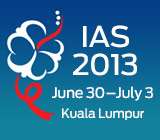 People with HIV have a rate of end-stage renal disease (ESRD) more than five times that of the general population, MedPage Today reports. Investigators analyzed medical records of almost 40,000 HIV-positive participants in the North American AIDS Cohort Collaboration on Research and Design. They looked for records of either ongoing dialysis or a kidney transplant between January 2000 and December 2009 and found that 617 participants had evidence of ESRD, with 306 of those people showing records of incident ESRD during the study period. The investigators presented their findings at the 7th International AIDS Society Conference on HIV Pathogenesis, Treatment and Prevention (IAS 2013) in Kuala Lumpur.
People with HIV have a rate of end-stage renal disease (ESRD) more than five times that of the general population, MedPage Today reports. Investigators analyzed medical records of almost 40,000 HIV-positive participants in the North American AIDS Cohort Collaboration on Research and Design. They looked for records of either ongoing dialysis or a kidney transplant between January 2000 and December 2009 and found that 617 participants had evidence of ESRD, with 306 of those people showing records of incident ESRD during the study period. The investigators presented their findings at the 7th International AIDS Society Conference on HIV Pathogenesis, Treatment and Prevention (IAS 2013) in Kuala Lumpur.
The researchers found that people with HIV had an ESRD incidence rate of 192 cases per 100,000 person years, compared with a rate of just 36 per 100,000 person-years in the general population.
Among the HIV-positive population studied, ESRD rates increased based on various factors, including advanced age, female sex and black race. Participants who were 18 through 39 years old had an ESRD rate of 146 per 100,000 person years, compared with a rate of 298 for those older than 60. Female participants had a rate of ESRD of 266 per 100,000 person-years, compared with 171 for men. (This difference between the sexes is the opposite from what is seen in the general population, and it is probably flipped because women in the study were more likely to be African American.) African Americans had an ESRD rate of 255 per 100,000 person-years, compared with just 54 for whites and 83 for Hispanics.
Blacks were 6.37 times as likely to experience ESRD compared with whites. Those who acquired the virus through heterosexual sex were 47 percent more likely than men who have sex with men to have ESRD. Those who had ever had an AIDS-defining illness had a 45 percent higher rate of ESRD. Having an undetectable viral load, meanwhile, reduced the likelihood of ESRD by 42 percent.
To read the MedPage Today story, click here.
To read the conference abstract, click here.
Advertisement
Advertisement
Advertisement






1 Comment
1 Comment